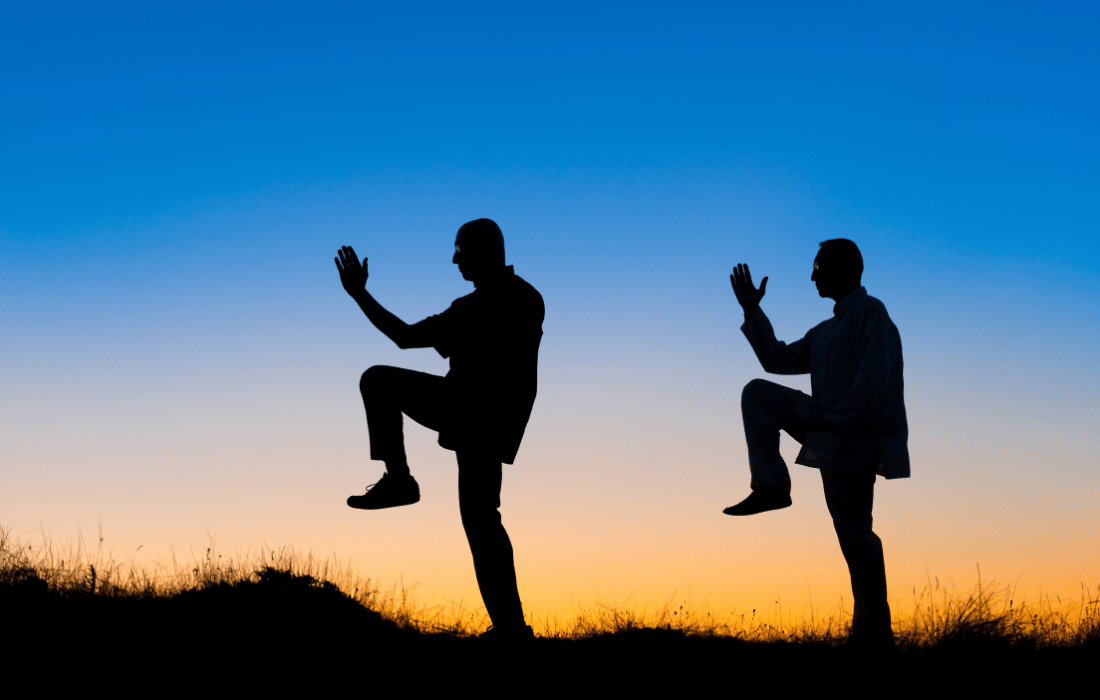In today’s fast-paced, high-performance world, men are conditioned to embody the Yang energy: strength, power, action, and resilience. We’re expected to push harder, lift heavier, work longer, and recover faster, all while carrying the weight of life’s responsibilities. Whether in the gym, the workplace, or at home, we’re rewarded for doing more, for staying in constant motion. Yet, many of us are burning out, feeling depleted, and struggling to find the balance our bodies and minds crave.
The truth is, that living in a constant state of Yang is unsustainable. It’s like driving a car with the pedal to the metal but never stopping for fuel or a tune-up. Eventually, things will break down. That’s why cultivating Yin practices—those quiet, slow, and restorative activities—are not only important but essential for long-term vitality and well-being. Unfortunately, for many men, the idea of slowing down, practicing Tai Chi, or sitting in meditation can feel foreign, tedious, or even embarrassing.
But here’s the question: What if we didn’t wait until we were older, tired, and desperate for relief before incorporating Yin practices? What if we embraced them now, while we still have the energy to cultivate a balanced, thriving life?
The Yin and Yang of Men’s Health

To fully understand why men need to embrace Yin practices, we first need to break down the ancient concept of Yin and Yang. In Chinese philosophy, Yin and Yang represent opposing but complementary forces that exist in all things. Yin is the feminine, passive, and restorative energy, while Yang is the masculine, active, and assertive force. In the context of health and fitness, Yang encompasses activities like weightlifting, sprinting, and intense workouts—anything that requires physical effort and strain. Yin, on the other hand, includes practices like meditation, yoga, Tai Chi, and breathwork—activities that promote recovery, relaxation, and mental clarity.
For centuries, Eastern cultures have emphasized the importance of balancing Yin and Yang for overall well-being. Western society, however, has glorified Yang energy, especially when it comes to men’s health. We are taught that strength, aggression, and constant movement are the hallmarks of masculinity, while stillness and introspection are often dismissed as “soft” or unnecessary.
But science is now catching up with ancient wisdom, and it’s telling us something profound: without enough Yin to balance the Yang, we risk burning out both physically and mentally.
The Science of Rest and Recovery
Research has shown that overtraining and constant stress can wreak havoc on the body. When we engage in high-intensity activities without adequate recovery, we’re putting our sympathetic nervous system (fight or flight mode) into overdrive. This constant state of stress leads to elevated cortisol levels, which, over time, can cause a host of health issues including:
- Increased risk of injury: Without proper recovery, muscles, tendons, and ligaments don’t have the time to repair, increasing the likelihood of strains, tears, and overuse injuries.
- Decreased testosterone levels: High cortisol levels are linked to lower testosterone production, which can impact muscle growth, energy levels, and even mood.
- Chronic inflammation: Overexertion without adequate rest increases inflammation in the body, which is linked to conditions like heart disease, arthritis, and even mental health issues like depression.
- Burnout and mental fatigue: Constant stress and overexertion don’t just wear down the body; they also wear down the mind. Over time, this can lead to anxiety, depression, and a feeling of being perpetually exhausted, both physically and emotionally.
Yin practices, such as Qi-Gong, Tai Chi, and yoga, have been shown to activate the parasympathetic nervous system (rest and digest mode), which helps counterbalance the effects of stress. These practices reduce cortisol levels, improve immune function, and promote muscle recovery, all of which contribute to a healthier, more resilient body.
Why It’s Hard for Men to Slow Down
As men, we’re wired for action. Whether it’s competing in sports, dominating at work, or achieving personal fitness goals, we thrive on the rush of accomplishment. Slowing down, tuning in to our bodies, and practicing stillness can feel unnatural—if not outright uncomfortable.
Let’s be honest: the idea of doing Tai Chi in the park surrounded by seniors can seem embarrassing. It’s easy to dismiss these practices as “old people stuff,” something you turn to when your body is too broken to handle the intensity it once did. But here’s the thing: those seniors practicing Tai Chi and Qi Gong know something we don’t—they’ve already pushed their bodies to the limit and are trying to repair the damage. Why should we wait until we’re broken down to start incorporating Yin practices?
This reluctance to embrace Yin activities is part of a larger cultural narrative. For generations, men have been told that to be masculine is to be hard, aggressive, and relentless. Rest is seen as weakness, recovery is an afterthought, and practices like yoga or meditation are often dismissed as “not for real men.” But this mindset is damaging, both to our bodies and our minds.
The True Strength of Yin Practices
What if we redefined strength? What if we stopped viewing Yin activities as a weakness and started seeing them for what they really are—a crucial part of maintaining health, longevity, and peak performance?
The truth is that Yin practices make you stronger, both physically and mentally. Yoga, for example, increases flexibility, mobility, and balance—qualities that are essential for preventing injury and improving overall athletic performance. In fact, a study published in the Journal of Strength and Conditioning Research found that athletes who incorporated yoga into their training routines experienced significant improvements in flexibility and balance, as well as reductions in injury rates.
Tai Chi, another Yin practice, has been shown to improve cardiovascular health, reduce stress, and enhance mental clarity. A study published in the British Journal of Sports Medicine found that regular Tai Chi practice improved balance, coordination, and lower body strength in participants. It also showed that Tai Chi had a significant positive impact on mental well-being, reducing symptoms of anxiety and depression.
Breathwork, another essential Yin practice, helps regulate the nervous system and improve focus. Deep diaphragmatic breathing activates the parasympathetic nervous system, reducing cortisol levels and promoting relaxation. Studies have shown that breathwork can improve heart rate variability (a key indicator of recovery), lower blood pressure, and enhance mental clarity.
Yin Practices You Can Incorporate Now
So how can you start incorporating Yin practices into your routine without feeling like you’re sacrificing your edge? Here are a few practical ways to start balancing your Yang energy with more Yin:
1. Yoga
Yoga isn’t just for flexible yogis. It’s an excellent way to improve mobility, reduce tension, and calm the mind. If you’re new to yoga, start with something simple like Hatha or Yin Yoga, which focuses on long, deep stretches and mindful breathing. Not only will this improve your flexibility, but it will also help you tune in to your body’s needs and improve recovery.
2. Tai Chi or Qi Gong
These ancient Chinese practices may seem slow and gentle, but they pack a powerful punch when it comes to balancing your energy. Tai Chi is a form of moving meditation that improves balance, coordination, and mental clarity. Qi Gong focuses on cultivating life force energy (or Qi) through slow, controlled movements and breathwork. Try a local class or follow along with online videos to experience the benefits.
3. Breathwork
Most of us are shallow breathers, taking quick, shallow breaths from our chest instead of deep, full breaths from our diaphragm. This activates the sympathetic nervous system and keeps us in a constant state of low-level stress. Incorporating breathwork into your routine, even for just five minutes a day, can dramatically reduce stress and improve mental clarity. Try techniques like box breathing or alternate nostril breathing to activate your parasympathetic nervous system and promote relaxation.
4. Meditation
Meditation isn’t about sitting cross-legged for hours on end. It’s about creating space for stillness and tuning in to your body and mind. Start with just five minutes of mindfulness meditation, focusing on your breath and observing your thoughts without judgment. Studies have shown that regular meditation practice can reduce stress, improve focus, and even change the structure of your brain, enhancing areas related to emotional regulation and decision-making.
5. Mobility and Stretching
You don’t need to go all-in on Yin practices to see the benefits. Start by incorporating more mobility work and stretching into your routine. This will not only improve your flexibility but also reduce your risk of injury and promote better recovery. Foam rolling, dynamic stretching, and even basic mobility exercises can go a long way in keeping your body healthy and balanced.
The Future of Men’s Health: Thriving, Not Just Surviving
As men, we’re often driven by the need to prove ourselves—whether that’s in the gym, at work, or in life. But true strength comes from balance. By incorporating Yin practices into your routine, you’re not only improving your physical health but also your mental and emotional well-being. You’re cultivating resilience, not just strength.
The reality is that we can’t keep pushing ourselves at full throttle without consequences. The body needs rest, recovery, and balance to function optimally. Yin practices aren’t a sign of weakness—they’re a sign of wisdom. The sooner we embrace them, the sooner we’ll be able to thrive, not just survive.
So the next time you see someone practicing Tai Chi in the park or sitting quietly in meditation, don’t dismiss it. Instead, consider what you could gain from incorporating these practices into your life. You might just find that slowing down is the key to going further.
Conclusion: Embrace Your Yin to Empower Your Yang
Incorporating Yin practices into your routine isn’t about abandoning the hard, intense workouts that you love—it’s about balancing them. When you nourish your body and mind with restorative activities like meditation, yoga, breathwork, and Tai Chi, you’re giving yourself the tools to recover faster, think clearer, and perform better in every area of your life.
It’s time to redefine what strength means. True strength isn’t just about how much weight you can lift or how fast you can run. It’s about resilience, adaptability, and balance. So, embrace your Yin. Your body—and your mind—will thank you for it.








